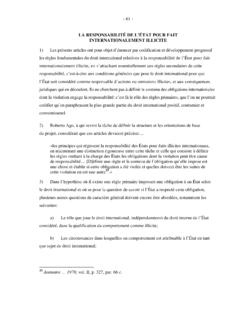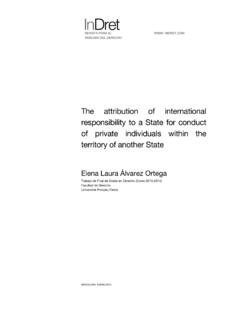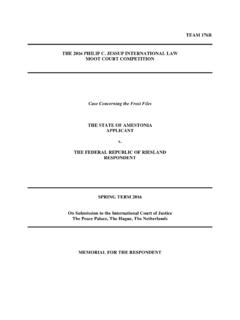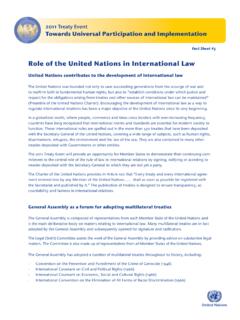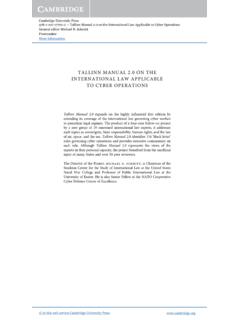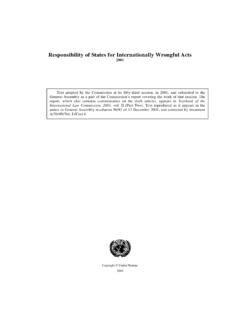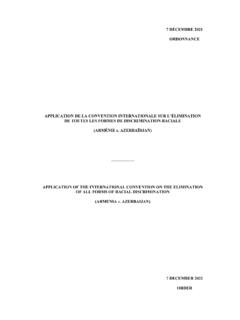Transcription of Responsibility of States for internationally wrongful acts
1 Commentaries to the draft articles on Responsibility of States for internationally wrongful acts adopted by the International Law Commission at its fifty-third session (2001) (extract from the Report of the International Law Commission on the work of its Fifty-third session, Official Records of the General Assembly, Fifty-sixth session, Supplement No. 10 (A/56/10), ) November 2001 - 59 - 2. Text of the draft articles with commentaries thereto 77. The text of the draft articles with commentaries thereto adopted by the Commission at its fifty-third session, are reproduced below: Responsibility OF States FOR internationally wrongful acts (1) These articles seek to formulate, by way of codification and progressive development, the basic rules of international law concerning the Responsibility of States for their internationally wrongful acts .
2 The emphasis is on the secondary rules of State Responsibility : that is to say, the general conditions under international law for the State to be considered responsible for wrongful actions or omissions, and the legal consequences which flow therefrom. The articles do not attempt to define the content of the international obligations breach of which gives rise to Responsibility . This is the function of the primary rules, whose codification would involve restating most of substantive international law, customary and conventional. (2) Roberto Ago, who was responsible for establishing the basic structure and orientation of the project, saw the articles as specifying the principles which govern the Responsibility of States for internationally wrongful acts , maintaining a strict distinction between this task and the task of defining the rules that place obligations on States , the violation of which may - 60 - generate Responsibility [I]
3 T is one thing to define a rule and the content of the obligation it imposes, and another to determine whether that obligation has been violated and what should be the consequences of the violation. 33 (3) Given the existence of a primary rule establishing an obligation under international law for a State, and assuming that a question has arisen as to whether that State has complied with the obligation, a number of further issues of a general character arise. These include: (a) The role of international law as distinct from the internal law of the State concerned in characterizing conduct as unlawful; (b) Determining in what circumstances conduct is to be attributed to the State as a subject of international law; (c) Specifying when and for what period of time there is or has been a breach of an international obligation by a State; (d) Determining in what circumstances a State may be responsible for the conduct of another State which is incompatible with an international obligation of the latter.
4 (e) Defining the circumstances in which the wrongfulness of conduct under international law may be precluded; (f) Specifying the content of State Responsibility , the new legal relations that arise from the commission by a State of an internationally wrongful act, in terms of cessation of the wrongful act, and reparation for any injury done; (g) Determining any procedural or substantive preconditions for one State to invoke the Responsibility of another State, and the circumstances in which the right to invoke Responsibility may be lost; (h) Laying down the conditions under which a State may be entitled to respond to a breach of an international obligation by taking countermeasures designed to ensure the fulfilment of the obligations of the responsible State under these articles.
5 This is the province of the secondary rules of State Responsibility . 33 Yearbook .. 1970, vol. II, p. 306, para. 66 (c). - 61 - (4) A number of matters do not fall within the scope of State Responsibility as dealt with in the present articles: First, as already noted, it is not the function of the articles to specify the content of the obligations laid down by particular primary rules, or their interpretation. Nor do the articles deal with the question whether and for how long particular primary obligations are in force for a State. It is a matter for the law of treaties to determine whether a State is a party to a valid treaty, whether the treaty is in force for that State and with respect to which provisions, and how the treaty is to be interpreted.
6 The same is true, mutatis mutandis, for other sources of international obligations, such as customary international law. The articles take the existence and content of the primary rules of international law as they are at the relevant time; they provide the framework for determining whether the consequent obligations of each State have been breached, and with what legal consequences for other States . Secondly, the consequences dealt with in the articles are those which flow from the commission of an internationally wrongful act as No attempt is made to deal with the consequences of a breach for the continued validity or binding effect of the primary rule ( the right of an injured State to terminate or suspend a treaty for material breach, as reflected in article 60 of the Vienna Convention on the Law of Treaties).
7 Nor do the articles cover such indirect or additional consequences as may flow from the responses of international organizations to wrongful conduct. In carrying out their functions it may be necessary for international organizations to take a position on whether a State has breached an international obligation. But even where this is so, the consequences will be those determined by or within the framework of the constituent instrument of the organization, and these fall outside the scope of the articles. This is particularly the case with action of the United Nations under the Charter, which is specifically reserved by article 59.
8 34 For the purposes of the articles, the term internationally wrongful act includes an omission, and extends to conduct consisting of several actions or omissions which together amount to an internationally wrongful act. See commentary to article 1, para. (1). - 62 - Thirdly, the articles deal only with the Responsibility for conduct which is internationally wrongful . There may be cases where States incur obligations to compensate for the injurious consequences of conduct which is not prohibited, and may even be expressly permitted, by international law ( compensation for property duly taken for a public purpose).
9 There may also be cases where a State is obliged to restore the status quo ante after some lawful activity has been completed. These requirements of compensation or restoration would involve primary obligations; it would be the failure to pay compensation, or to restore the status quo which would engage the international Responsibility of the State concerned. Thus for the purposes of these articles, international Responsibility results exclusively from a wrongful act contrary to international law. This is reflected in the title of the articles. Fourthly, the articles are concerned only with the Responsibility of States for internationally wrongful conduct, leaving to one side issues of the Responsibility of international organizations or of other non-State entities (see articles 57, 58).
10 (5) On the other hand the present articles are concerned with the whole field of State Responsibility . Thus they are not limited to breaches of obligations of a bilateral character, under a bilateral treaty with another State. They apply to the whole field of the international obligations of States , whether the obligation is owed to one or several States , to an individual or group, or to the international community as a whole. Being general in character, they are also for the most part residual. In principle States are free, when establishing or agreeing to be bound by a rule, to specify that its breach shall entail only particular consequences and thereby to exclude the ordinary rules of Responsibility .
